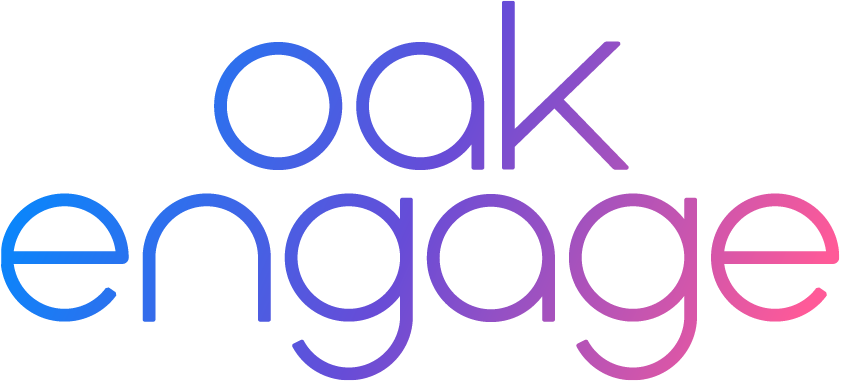Experts reveal top tips to enhance employee wellbeing and happiness

- Nearly half (47%) of people feel stressed or overwhelmed at work
- 46% of Brits reported that work life balance was the main contributing factor to happiness at work
- Over a quarter of employees (26%) said they were unhappy in their current job
- 75% of employees have experienced a toxic workplace environment
A survey of more than 1,200 employees by award-winning employee engagement and intranet solution, Oak Engage has found that nearly half (47%) of people feel stressed or overwhelmed at work, with over a quarter of employees (26%) saying they are unhappy in their current job.
The survey shows that work life balance (46%), job security (32%), atmosphere and relationships (31%) and flexibility (30%) are the main factors that contribute to happiness at work.
The survey also found that a third (33%) of people reported their place of work does not recognise employee achievements and 16% rated the communication of their company as poor or terrible.
So why are some of us still unhappy at work and what can we do about it? Employee wellbeing experts, Oak Engage and Executive Life Coach at Working Life, Dr Cécile Jenkins share their tips on how to improve employee wellbeing and empower your people to find true happiness at work.
Open and honest communication
Communication is a driving force for better outcomes within an organisation. Prioritise two-way communication to allow employees to share their opinion so they feel valued, appreciated and heard.
Cécile Jenkins, Executive Life Coach at Working Life said: “Trust plays a key role in how we feel about our colleagues, managers and leaders. So much so that when there is conflict in a work relationship, we often lose all trust in that colleague. Furthermore, when that trust between the whole workforce and its leaders breaks down, this can be catastrophic for an organisation.”
“Leaders should communicate clearly, consistently, and regularly – even when they have nothing to say. This way, people can start to trust there isn’t anything they’re not being told which will allow the trust to increase. Giving employees a voice isn’t just about letting them have their say. The real value comes from actively listening. This requires leaders to show interest, empathy and compassion. More importantly, when leaders follow through on what they’ve heard, employees will feel the care and trust has increased. That’s where the real magic happens.”
Recognise and reward employees
33% of people reported that their place of work does not recognise employee achievements. Businesses need to acknowledge the contributions of employees regularly. Recognition boosts morale and motivates employees to produce better work.
Cécile comments: “When we sign a contract, we agree the terms and conditions of our employment, but we are also agreeing a ‘psychological contract’, the unwritten, intangible and mutual expectations between the employee and the organisation. This contract is not written down, but it nonetheless exists, and its effects can be very powerful.”
“It includes, for example, that we expect not to be made ill by the job, that we expect to be treated well, and that we will do our best to do a good job, will arrive on time and work hard. We weigh these ‘terms and conditions’ up against the reward – if we put a lot into the job, and perhaps even make sacrifices doing so, what do we feel we’re getting in return? When one in three people feel that the balance between what they put in and the acknowledgement they get for that isn’t fair, employers can do more to recognise and reward. Training line managers in this, and running company-wide recognition schemes are just two examples of how this can be supported.”
Will Murray, CEO at Oak Engage adds: “It’s important to celebrate employee achievements, no matter how small. This will build momentum and keep employees motivated. Oak uses technology that allows everyone to celebrate achievements and milestones in order to create a closer community. Recognition is critical when it comes to boosting employee morale.”
Focus on work life balance and wellbeing
Oak Engage’s survey revealed that the main driver of employee happiness is work life balance. Now more than ever it’s not enough to focus on just benefits. Businesses need to focus on improving employee work life balance in order to boost happiness.
Consider the CIPD's 7 key domains of employee wellbeing, which include health, good work, values/principles, collective/social aspects, personal growth, good lifestyle choices, and financial wellbeing. Effective communication, flexible working, personal development, promoting self-care, encouraging good lifestyle choices, giving regular performance reviews and implementing a company intranet are all strategies that can improve employee wellbeing.
Cécile said: “While employees hold the power to create and protect their own work-life balance, if they are not supported in this by the organisation, its leaders and their line managers, it can have a significant negative impact. Supporting initiatives such as giving people the right to disconnect and tackling back-to-back meeting culture are just a few of the ways employers can support people’s work-life balance.”
Promote a positive work environment
Encourage social interaction both in-office and remotely, through team events, dedicated lunch spaces and employee recognition. It’s also important for businesses to create a culture where employees feel safe to raise any issues they may have. A strong company culture is associated with higher employee engagement rates.
Cécile comments: “Since the coronavirus pandemic our working practices have changed significantly and what we’re seeing now in relation to hybrid working is that companies are making a choice. One day, two days, five days in the office… There isn’t a one-size-fits-all answer to this, and it is much too early to say what is best for organisations long term.”
“What we do know is that people need connection. A recent survey of 1,000 employees by Enboarder shows 94% of employees agreed they were more productive when they feel connected to their colleagues – in person or remotely – and those that feel more connected were four times more likely to also be very satisfied with their jobs. This is something to take notice of. When companies support connection, they’ll reap the benefits. Encourage peers to share and come together, create a buddy system for new starters, ensure your managers are well trained and understand the importance of personal connections, and give them time to act on that. And, of course, make sure that any office days are as full of opportunities to connect with others as possible.”
Make employees part of the bigger picture
Employees want to feel a sense of purpose at work. You need to allow employees to understand how their role contributes to the larger goals of the organisation. If employees feel that their work has purpose it will greatly increase employee job satisfaction.
Cécile said: “‘Purpose in life’ is one of the six components of wellbeing (Ryff, 1989), and when we can connect our sense of purpose to the organisation, our function and our individual role, this can contribute to finding more meaning and fulfilment at work, and therefore more happiness. Employer-supported volunteering has recently been called out as having a particularly positive effect on wellbeing as it provides a great focus for organisations to invest in. When I work with people in demanding roles who are considering how aligned their job is to their life’s aspirations, taking on a volunteering role is often felt to be a way to satisfy their desire to have an impact in line with their individual values. If employers can find a way to tap into that, within the work context, this could well lead to higher job satisfaction, and ultimately higher retention of talent.”
Will Murray, CEO at Oak Engage comments: “Employee happiness is not just beneficial, it’s critical. By prioritising employee well-being and creating a supportive work atmosphere, companies can not only enhance job satisfaction but also drive innovation and growth. From our own research, we can confirm there has been a slight positive shift in employee attitudes to work. However, with the persistence of trends such as ‘quiet quitting’, ‘rage applying’ and ‘act your wage’, it’s clear there’s still work that needs to be done.
“Through our research we wanted to highlight the importance of employee wellbeing and the need for businesses to create an environment where employees feel valued, understood and connected to their work. This is essential for fostering lasting happiness and productivity. Products like Oak Engage’s intranet build a culture that celebrates achievement, encourages open communication and recognises the individual needs of each employee.”
ENDS
Note to Editors
For more information contact:
Emma Williamson | Head of Marketing & PR | 07548831780
About Oak Engage
Oak Engage is an award-winning employee engagement and intranet solution. They deliver AI personalised content across a modern intranet and employee engagement app. They empower HR and Internal Comms teams to surface relevant content, to the right people, at the right time.
Oak launched in 2017 and are trusted by the world’s biggest brands to connect teams, engage their people and work better together through their mobile app and SaaS (Software as a Service) platform on the cloud. Oak Engage is here to simplify communication. They are here to build a better way to communicate, whilst working with businesses to address their communication challenges in order to empower people. The customer is at the heart of Oak Engage, with an attentive support team on hand to help with any customer queries.
Oak Engage’s key achievements to date:
- Leading product and ClearBox Intranet Choice winner 2024
- Award-winning: the Nation’s Best Intranet 2022 with NatWest Group at the IoIC Awards
- High performer: Continually recognised as a High Performer by G2
- Committed to data security with ISO 27001 and Cyber Essentials Plus accreditations
- Goes above and beyond for customers with 100% satisfaction rate
- 9.5 quality of support score on G2
- Goes above and beyond for their people with 4.5/5 rating on Glassdoor
- Trusted by the world’s biggest brands including Aldi, Five Guys, ITV and NatWest Group
About Cécile Jenkins
Working Life (workinglife.co.uk) was set up by Dr Cécile Jenkins, specialist in transformational change and accredited Executive Life Coach, to help those in demanding jobs (and lives) go from feeling tired, disengaged and frustrated to confident, motivated and energised.
Cécile has helped leaders with organisational change, communications and culture in the corporate, public and not-for-profit sector for over 20 years. Trained in Executive Coaching at the world-renowned Henley Business School and with a PhD in the social sciences, she works with people to create long-lasting change in their working lives using methods such as Positive Intelligence, Intentional Change Theory and Acceptance & Commitment Therapy.




